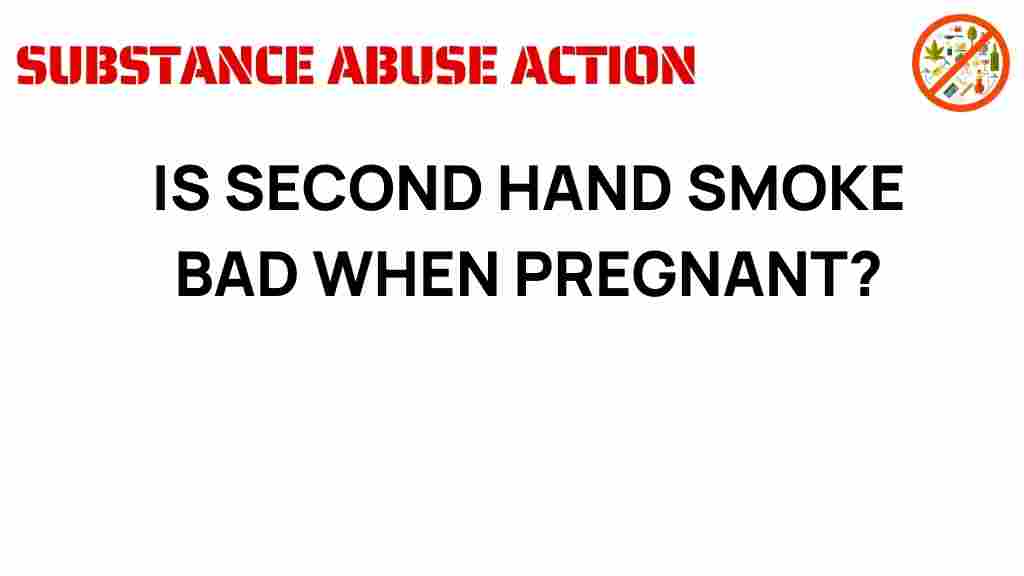The Hidden Dangers: Is Secondhand Smoke Harmful During Pregnancy?
When it comes to the health of both mothers and their unborn children, understanding the risks associated with secondhand smoke is crucial. Many expectant mothers may not be fully aware of the implications that tobacco exposure can have on fetal health and maternal health. This article aims to explore the various pregnancy risks linked to secondhand smoke and provide insights into how it can affect prenatal care and public health.
Understanding Secondhand Smoke
Secondhand smoke refers to the smoke that is exhaled by a smoker or that which comes from the burning end of a cigarette, cigar, or pipe. It contains over 7,000 chemicals, many of which are toxic and can lead to serious health problems. Pregnant women are particularly vulnerable to the effects of secondhand smoke, making it essential to understand the associated risks.
Pregnancy Risks Associated with Secondhand Smoke
Exposure to secondhand smoke during pregnancy poses several risks that can compromise both maternal and fetal health. Here are some of the primary concerns:
- Low Birth Weight: Babies born to mothers exposed to secondhand smoke are at a higher risk of being born with low birth weight. This condition can lead to various health complications.
- Preterm Birth: Research indicates that secondhand smoke exposure increases the likelihood of preterm labor, which can lead to premature delivery.
- Developmental Issues: Children exposed to smoking effects in utero may face developmental challenges, including learning disabilities and behavioral problems.
- Respiratory Problems: Exposure to tobacco smoke can lead to long-term respiratory issues in children, including asthma and other chronic lung conditions.
- Increased Risk of Sudden Infant Death Syndrome (SIDS): There is a strong correlation between secondhand smoke exposure and an increased risk of SIDS in infants.
Impact on Maternal Health
In addition to the risks posed to fetal health, secondhand smoke also has detrimental effects on maternal health. Some of the key issues include:
- Increased Blood Pressure: Pregnant women exposed to secondhand smoke may experience elevated blood pressure, which can complicate pregnancy and lead to conditions like preeclampsia.
- Increased Stress Levels: The stress of living with a smoker and the awareness of potential risks can contribute to mental health challenges for pregnant women.
- Compromised Immune System: Secondhand smoke can weaken the immune response, making pregnant women more susceptible to infections.
Understanding Tobacco Exposure and Fetal Health
Fetal health is profoundly impacted by tobacco exposure. The harmful substances in secondhand smoke can cross the placenta, affecting the developing fetus in several critical ways:
- Oxygen Deprivation: Smoking reduces oxygen levels in the mother’s blood, which can lead to oxygen deprivation for the fetus, impacting its growth and development.
- Altered Brain Development: Exposure to nicotine and other chemicals can interfere with brain development, potentially leading to cognitive and behavioral issues later in life.
- Increased Risk of Birth Defects: Some studies suggest a link between secondhand smoke and an increased risk of congenital defects.
Public Health and Environmental Hazards
Secondhand smoke is not just a private health issue; it also poses significant public health challenges. The effects of tobacco exposure extend beyond individual cases and contribute to broader environmental hazards. The following points highlight these concerns:
- Air Quality: Secondhand smoke contributes to poor air quality, which can have widespread effects on community health.
- Health Care Costs: The healthcare system incurs significant costs related to treating conditions caused by secondhand smoke exposure, impacting public resources.
- Legislation and Public Spaces: Many jurisdictions have enacted laws to restrict smoking in public spaces to protect vulnerable populations, including pregnant women.
Importance of Prenatal Care
Regular prenatal care is essential for monitoring maternal and fetal health. It provides an opportunity for healthcare providers to discuss the risks associated with secondhand smoke exposure. Here are some steps expectant mothers can take during their prenatal visits:
- Open Communication: Discuss your exposure to secondhand smoke with your healthcare provider. They can provide personalized advice and resources.
- Educate Yourself: Learn about the risks of tobacco exposure and effective ways to mitigate these risks.
- Support Systems: Seek support from family and friends to create a smoke-free environment.
Tips for Avoiding Secondhand Smoke Exposure
To protect both maternal and fetal health, it is crucial to minimize exposure to secondhand smoke. Here are some practical tips:
- Avoid Smoky Environments: Steer clear of places where smoking is common, such as bars and certain outdoor events.
- Communicate with Loved Ones: Inform family and friends about your pregnancy and the importance of avoiding smoking around you.
- Utilize Public Health Resources: Take advantage of local programs aimed at reducing tobacco exposure and promoting smoke-free environments.
Conclusion
Understanding the risks of secondhand smoke is vital for the health of both mothers and their unborn children. By recognizing the potential hazards and taking steps to minimize exposure, expectant mothers can significantly reduce the pregnancy risks associated with tobacco exposure. It is essential for public health initiatives to continue addressing smoking effects and protect vulnerable populations, ensuring a healthier future for all.
For further information on prenatal care and reducing tobacco exposure, consider visiting CDC’s Tobacco and Pregnancy page.
For additional resources and support, check out Smokefree.gov, where you can find helpful tips and programs designed to help you quit smoking.
This article is in the category Health and created by SubstanceAbuseAction Team
